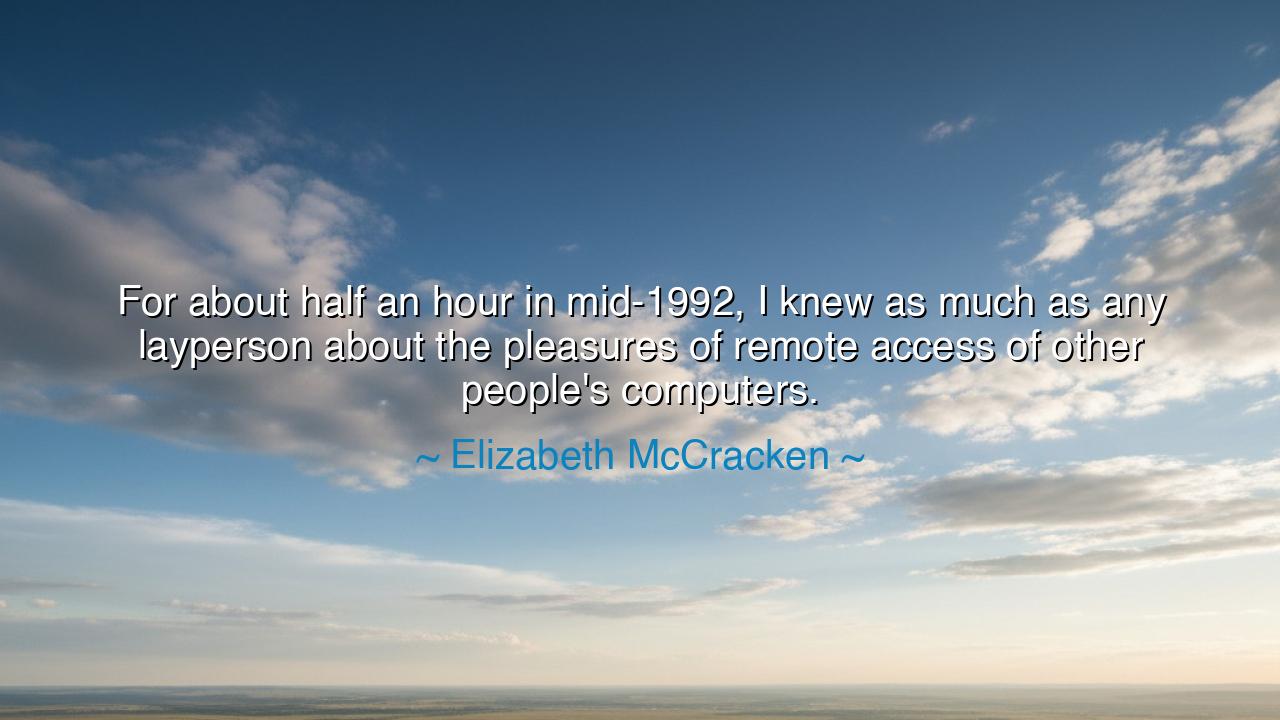
For about half an hour in mid-1992, I knew as much as any
For about half an hour in mid-1992, I knew as much as any layperson about the pleasures of remote access of other people's computers.






“For about half an hour in mid-1992, I knew as much as any layperson about the pleasures of remote access of other people's computers.” — Elizabeth McCracken
In this curious and shimmering confession, Elizabeth McCracken speaks not merely of computers or the youthful thrill of mischief, but of that timeless moment when knowledge meets temptation, and human curiosity dares to trespass beyond the known. Her words, half amused and half repentant, echo an ancient truth: that power, once tasted, changes the soul. She remembers not an era of wires and code alone, but a fleeting instant when she glimpsed the vast new world of the digital frontier, a realm both wondrous and perilous, where minds may wander farther than their bodies ever could.
The early 1990s were a time of awakening—a dawn when humankind first reached through the invisible web of electrons to touch distant machines. For a brief moment, McCracken stood at that threshold. Like a sailor gazing into uncharted seas, she felt the pulse of discovery and the intoxication of remote access, of bending unseen distance to her will. Her admission—“for about half an hour”—is not modesty, but reverence. She knew, in that small window of time, what it felt like to hold the key to other realms, to sense the raw pleasure of connection unbound by space. Yet beneath the delight lies the shadow of conscience, for to peer into another’s domain, even with innocent wonder, is to feel the first sting of the forbidden.
Throughout history, mankind has stood at such crossroads. When Prometheus stole fire from the gods, he too knew the thrill of mastery—and the peril of trespass. When the scholars of Alexandria first unrolled papyrus scrolls of secret knowledge, they felt the same pulse that McCracken describes: the rush of discovery, the whisper of danger. And in our modern age, the flicker of a computer screen has replaced the sacred flame. For what is remote access but a new form of fire—capable of illuminating the world or burning it to ash?
One might recall the tale of Kevin Mitnick, the infamous hacker of the late twentieth century. Like a clever thief of circuits, he slipped through the defenses of great corporations, not always for gain, but for the sheer rapture of understanding—the same brief “pleasure” McCracken names. Yet his journey ended in chains, a lesson written in digital ink: that curiosity without wisdom becomes folly. It is not the seeking of knowledge that damns us, but the failure to honor the sanctity of others’ worlds. The ancient sages taught the same: the wise man does not open every door, even when he knows how.
Thus, McCracken’s reflection, laced with humor and nostalgia, becomes a mirror of the human condition. It reminds us that progress forever dances with temptation, and that even fleeting mastery can awaken both awe and guilt. The “pleasures of remote access” symbolize our eternal longing to reach beyond the self—to see, to know, to touch what lies hidden. But the wise heart learns that true mastery is self-restraint, and that the greatest access is not to others’ secrets, but to one’s own integrity.
Let us, then, take from her words a lesson for our age of screens and passwords: Respect the boundaries that define trust. Seek knowledge, but never at the cost of another’s privacy or peace. Be explorers of understanding, not invaders of sanctuaries. Use your mind as a light, not a prybar. For every act of access, virtual or moral, carries a choice—between reverence and violation, between illumination and harm.
And so, my children of the digital dawn, let McCracken’s brief half hour be a parable. In it lies the joy of curiosity and the wisdom of humility. Walk boldly into the future, but carry within you the ancient law: that knowledge is sacred, and must be handled with clean hands and a pure heart. In every age—be it of fire, parchment, or code—the soul’s worth is measured not by what it can unlock, but by what it chooses to leave untouched.






AAdministratorAdministrator
Welcome, honored guests. Please leave a comment, we will respond soon